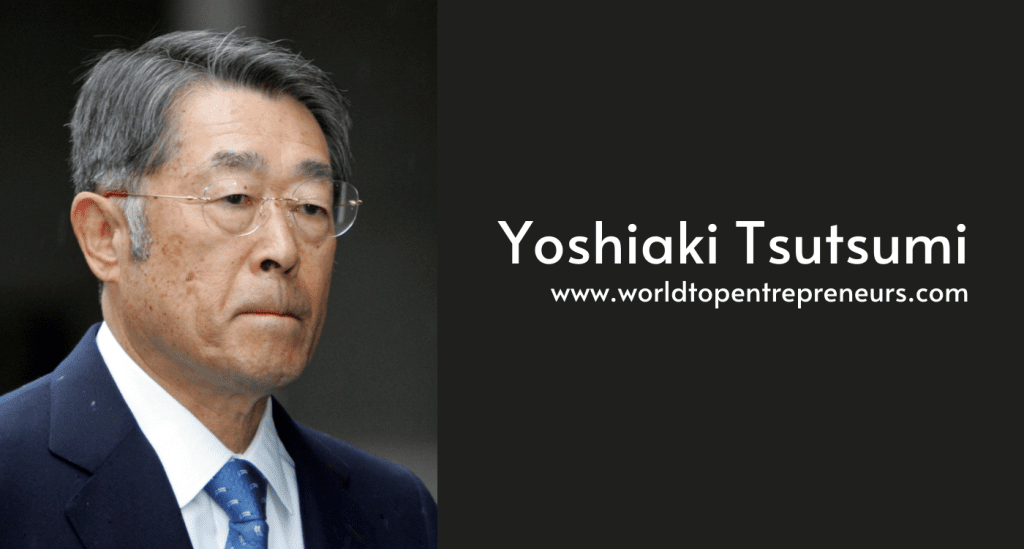Introduction
In the bustling realm of Japanese transportation and real estate, few names resonate with the same level of innovation and influence as Yoshiaki Tsutsumi. As the founder of Seibu Railway Co., Ltd., Tsutsumi played a pivotal role in shaping both the transportation infrastructure and the real estate landscape in Japan. His vision, entrepreneurial spirit, and strategic acumen led to the development of a transportation empire that not only revolutionized travel but also had a profound impact on urban development and real estate. This article delves into the life and achievements of Yoshiaki Tsutsumi, exploring how his leadership and innovative approach helped define the modern transportation and real estate sectors.
Early Life and Background
Yoshiaki Tsutsumi was born on February 19, 1927, in Tokyo, Japan, during a time of significant upheaval and transformation. Growing up in a post-war Japan, Tsutsumi witnessed firsthand the country’s recovery and rapid modernization. The experiences of his early years were shaped by the socio-economic challenges of the time, including the reconstruction of the nation’s infrastructure and the burgeoning growth of urban centers.
Tsutsumi’s academic background provided a solid foundation for his future endeavors. He pursued studies in engineering and business, which equipped him with the technical expertise and strategic insight necessary for his future ventures. His education was marked by a keen interest in transportation and urban development, areas that would become central to his career.
The Birth of Seibu Railway Co., Ltd.
In 1955, Yoshiaki Tsutsumi took a significant step by founding Seibu Railway Co., Ltd. The company’s origins can be traced back to a small railway business, but Tsutsumi’s vision was far-reaching. He saw the potential to transform the company into a major player in Japan’s transportation sector and to leverage its success to drive broader economic and urban development.
Tsutsumi’s approach to building Seibu Railway was characterized by a focus on innovation and customer satisfaction. Recognizing the need for efficient and reliable transportation solutions, he invested in modernizing the railway infrastructure and expanding the network. Under his leadership, Seibu Railway Co., Ltd. quickly became known for its commitment to quality and excellence in service.
One of Tsutsumi’s early achievements was the development of the Seibu Ikebukuro Line, which connected Tokyo with the surrounding suburban areas. This line played a crucial role in alleviating congestion in the city and providing residents with convenient access to transportation. Tsutsumi’s vision for a well-connected urban and suburban network was a key factor in the success of Seibu Railway.
Innovation and Expansion
Yoshiaki Tsutsumi’s leadership was marked by a relentless pursuit of innovation and expansion. He understood that the key to success in the transportation industry lay not only in providing reliable services but also in continuously improving and expanding the company’s offerings. This approach allowed Seibu Railway Co., Ltd. to grow and thrive in a competitive market.
One of Tsutsumi’s notable contributions was the introduction of advanced train technology. Seibu Railway invested in state-of-the-art trains and infrastructure, including high-speed trains and modern signaling systems. These innovations helped to improve the efficiency and reliability of the railway network, setting Seibu Railway apart from its competitors.
In addition to technological advancements, Tsutsumi focused on expanding the company’s reach. Under his leadership, Seibu Railway expanded its network to cover new areas and connect previously underserved regions. This expansion not only enhanced transportation options for commuters but also contributed to the company’s growth and profitability.
Tsutsumi’s strategic vision extended beyond transportation. He recognized the potential for synergy between transportation and real estate development. By integrating these two sectors, Tsutsumi aimed to create comprehensive and sustainable urban environments. This approach laid the foundation for Seibu Railway’s involvement in real estate and urban development.
Real Estate and Urban Development
Yoshiaki Tsutsumi’s impact on real estate and urban development was as transformative as his contributions to transportation. He saw the opportunity to leverage the success of Seibu Railway to drive growth in the real estate sector and contribute to the development of vibrant and thriving communities.
One of Tsutsumi’s key initiatives was the development of large-scale residential and commercial projects around Seibu Railway’s transportation hubs. By creating integrated communities that combined residential, commercial, and recreational facilities, Tsutsumi aimed to enhance the quality of life for residents and attract businesses to the area.
The development of Seibu’s flagship projects, such as the Seibu Dome and Seibu Princess House, exemplified Tsutsumi’s approach to real estate. The Seibu Dome, a state-of-the-art sports and entertainment venue, became a major attraction and a focal point for the community. Similarly, the Seibu Princess House, a high-end residential development, offered luxurious living spaces and contributed to the company’s reputation as a leader in real estate.
Tsutsumi’s emphasis on creating well-planned and integrated communities had a lasting impact on urban development in Japan. His approach to real estate development focused on creating spaces that were not only functional but also aesthetically pleasing and conducive to a high quality of life. This philosophy influenced subsequent urban development projects and contributed to the evolution of modern Japanese cities.
Challenges and Resilience
The journey of Yoshiaki Tsutsumi and Seibu Railway Co., Ltd. was not without its challenges. The transportation and real estate sectors are highly competitive and subject to various external factors, including economic fluctuations and regulatory changes. Despite these challenges, Tsutsumi’s leadership and resilience played a crucial role in navigating the complexities of the industry.
One of the significant challenges faced by Seibu Railway was the need to continuously adapt to changing market conditions. The transportation industry is characterized by rapid technological advancements and shifting consumer preferences. Tsutsumi’s ability to anticipate trends and invest in new technologies was essential in maintaining Seibu Railway’s competitive edge.
In addition to technological and market challenges, Seibu Railway also faced regulatory and financial hurdles. The company’s expansion and real estate development efforts required substantial investment and coordination with various stakeholders. Tsutsumi’s strategic thinking and problem-solving skills were instrumental in overcoming these challenges and ensuring the success of the company’s projects.
Legacy and Impact
Yoshiaki Tsutsumi’s legacy is defined by his remarkable contributions to the transportation and real estate sectors. As the founder of Seibu Railway Co., Ltd., Tsutsumi played a pivotal role in shaping Japan’s transportation infrastructure and driving urban development. His vision for creating integrated and sustainable communities has had a lasting impact on the way cities are developed and organized.
One of Tsutsumi’s most enduring legacies is his commitment to innovation and excellence. His leadership at Seibu Railway was marked by a focus on improving transportation services and investing in cutting-edge technology. The success of Seibu Railway’s trains and infrastructure is a testament to Tsutsumi’s dedication to delivering high-quality services and meeting the needs of commuters.
Tsutsumi’s influence extended beyond transportation to the realm of real estate and urban development. His approach to creating integrated and well-planned communities has influenced the development of modern Japanese cities. The legacy of Tsutsumi’s real estate projects is evident in the continued success of Seibu Railway’s developments and the positive impact they have had on residents and businesses.
In addition to his professional achievements, Tsutsumi is remembered for his philanthropic efforts and contributions to society. His commitment to improving the quality of life for individuals and communities reflects his belief in the importance of giving back and making a positive impact on society.
Personal Reflections and Philosophy
Yoshiaki Tsutsumi’s approach to business and leadership was shaped by his personal philosophy and values. He was known for his dedication to his work and his unwavering commitment to achieving excellence. Tsutsumi’s leadership style was characterized by a combination of strategic vision, hands-on involvement, and a focus on long-term goals.
Tsutsumi’s personal reflections on success and challenges reveal a thoughtful and determined individual. His ability to navigate the complexities of the transportation and real estate sectors and adapt to changing conditions was a testament to his resilience and strategic thinking. Tsutsumi’s journey from the early days of Seibu Railway to the establishment of a major transportation and real estate empire was marked by both triumphs and obstacles, but his dedication to innovation and excellence remained constant.
Conclusion
Yoshiaki Tsutsumi’s story is one of visionary leadership and transformative impact. As the founder of Seibu Railway Co., Ltd., Tsutsumi played a crucial role in shaping Japan’s transportation infrastructure and driving urban development. His innovative approach to transportation and real estate has left a lasting mark on the industry and contributed to the evolution of modern Japanese cities.
Tsutsumi’s legacy is reflected in the continued success of Seibu Railway and the enduring influence of his work. His contributions to transportation and real estate have inspired subsequent generations of entrepreneurs and leaders, demonstrating the power of vision, creativity, and dedication in achieving success.
As we look back on Tsutsumi’s achievements and the impact of Seibu Railway Co., Ltd., it is clear that his contributions have shaped the transportation and real estate sectors in profound ways. Yoshiaki Tsutsumi’s influence will continue to be felt in the world of transportation and urban development, serving as an inspiration for future generations and a testament to the power of innovative thinking and leadership.





















